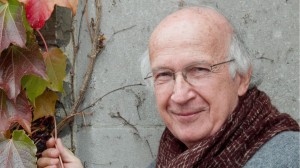Roald Hoffmann, who received the Nobel Prize in chemistry in 1981, will deliver the 2014 Kilpatrick Lecture at 3 p.m. on Monday, September 15, 2014 in the McCormick Tribune Campus Center (MTCC) Auditorium. A reception and poster session will follow. All students, faculty, and staff are invited. Please RSVP to rsvpevents@iit.edu by September 10, 2014.
Hoffmann is the Frank H.T. Rhodes Professor Emeritus of Humane Letters at Cornell University. In his lecture, “All the Ways To Have a Bond,” he will discuss common experimental criteria for judging the presence and strength of a chemical bond; theoretical criteria; the utility of all of these measures; and how researchers might push their limits.
Hoffmann was awarded the Nobel Prize, jointly with Kenichi Fukui, for “their theories, developed independently, concerning the course of chemical reactions.” A pioneer computational chemist, Hoffmann developed the Extended Hückel method in 1963 and applied it for investigation of the electronic structure of boron hydrides and polyhedral molecules. He also developed, together with R. B. Woodward, rules for elucidating reaction mechanisms, later known as the Woodward-Hoffmann rules, and introduced the isolobal principle to predict and explain bonding properties in organometallic compounds.
Hoffmann’s research group at Cornell studies bonding in chemical systems to provide a conceptual framework for experimentalists who are synthesizing new compounds with unusual structures and properties. Assistant Professor of Chemistry Andrey Rogachev was a postdoc in the group.
Born in Zolochiv (Poland at that time, now Ukraine), to a Jewish family, Hoffmann survived the Holocaust and came to the United States in 1949. He earned a B.S. in chemistry at Columbia University (Columbia College) and a Ph.D. in chemical physics from Harvard. He has received numerous honors including the Linus Pauling Award and the Priestley Medal. He has written poetry, books and plays, and was featured on the “World of Chemistry” series on PBS.
The Kilpatrick Lecture honors Martin and Mary Kilpatrick, who were a longtime chair and faculty member, respectively, in the chemistry department.

